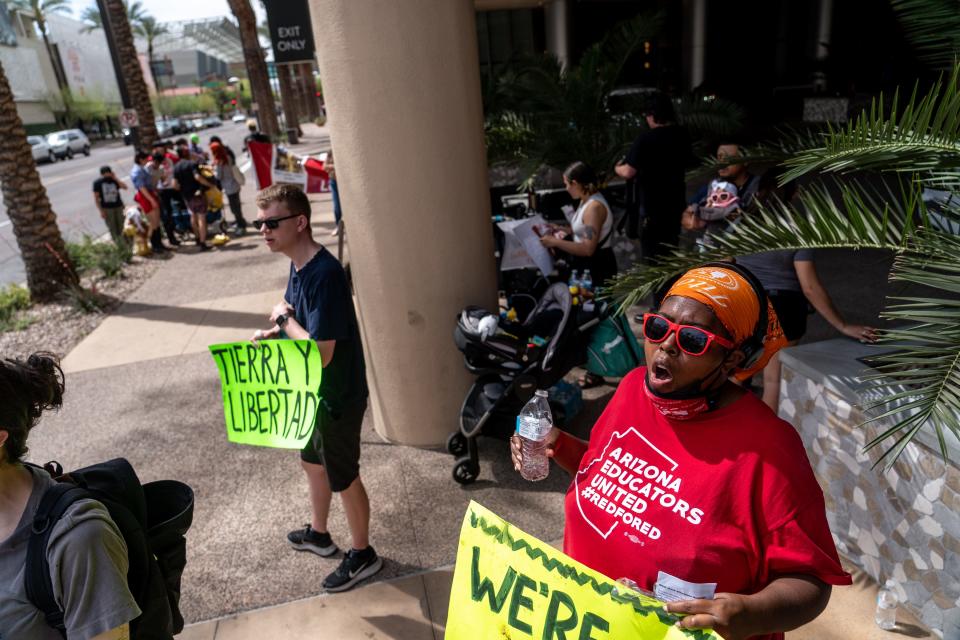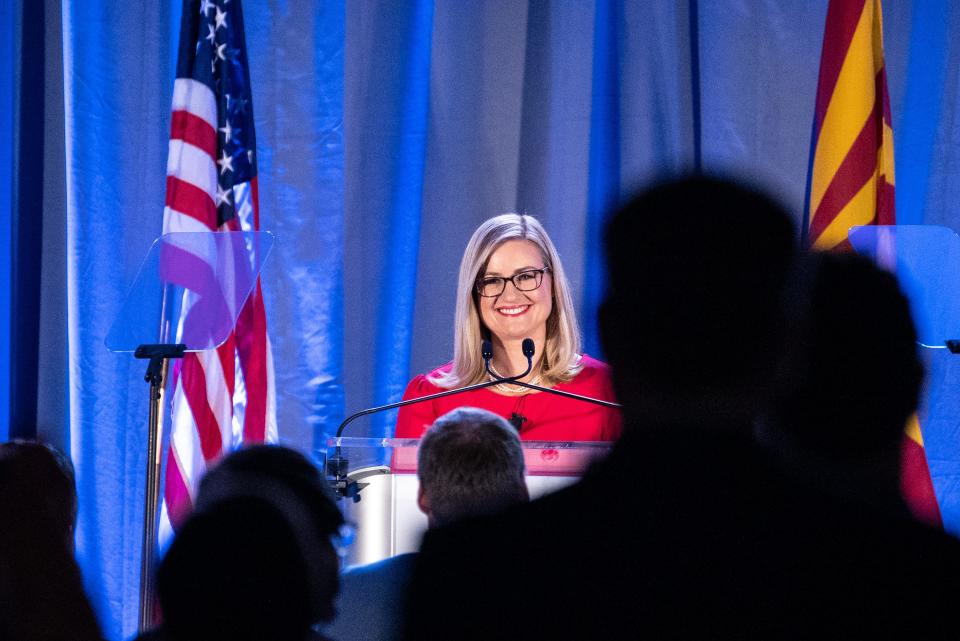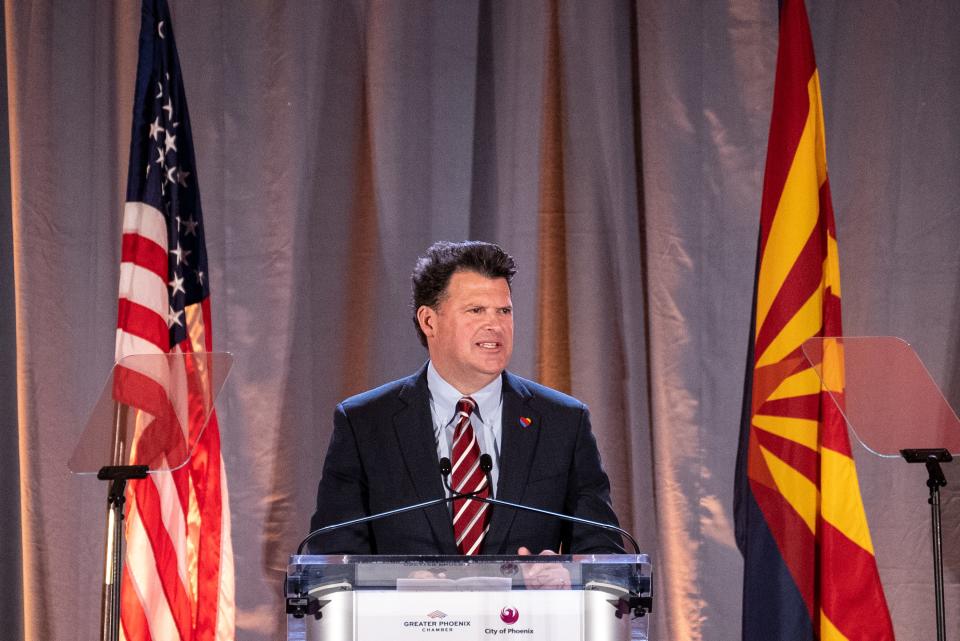Secure water, cure cancer: Phoenix Mayor Gallego vows to build 'most sustainable desert city'
- Oops!Something went wrong.Please try again later.
Securing the city's water future, helping cure cancer, and taking a "progressive" but also "practical" approach to policing — Phoenix Mayor Kate Gallego covered a lot in her 2023 State of the City address and promised that "pragmatism" would deliver the results.
"We are capitalizing on opportunities every day to usher in a better future," Gallego said. "Phoenix is the city to watch, and we are ready to deliver."
Speaking to business owners, nonprofit heads and tribal leaders at the Sheraton Hotel in downtown Phoenix, the mayor touted an advanced water purification facility the city plans to build by 2030. She highlighted light rail extensions expected to open in the next year, and the growing technology sector and medical innovation facilities locating in the city.
The mayor also used the address to call on the state Legislature to "carve a path" to pass Proposition 400, a regional transportation sales tax; invite the public to support the city's upcoming $500 million bond program; address how Phoenix is navigating growing homelessness and the housing shortage; and share initiatives the city is expanding to combat climate change, such as cool pavement and cool corridors.
"As the transit mayor," Gallego said, "failure on Prop. 400 is not an option. An extension of the half-cent tax is necessary, and county residents overwhelmingly agree. Let’s get it on the ballot and get this done."

The audience of several hundred people applauded medical and technology advancements — and the mayor's mom jokes.
"Raising a 6-year-old and running a city have more in common than you'd expect," Gallego said, calling herself a "mom-mayor."
Gallego's son, Michael, became the through line of her speech, as she mentioned his name repeatedly to demonstrate how action today would build a prosperous future.
A small group of protesters gathered outside the hotel before Gallego's address to condemn the city for inadequately addressing housing insecurity.
Dubbed the "people's state of the city," a pamphlet the protesters handed out shared the story of residents from three mobile home parks in Phoenix who are facing eviction because the parks' land owners want to repurpose the parks for other uses.
Gallego has found herself in a tense position on the City Council in recent months, frequently siding against a progressive minority coalition of Councilmembers Carlos Garcia, Laura Pastor, Betty Guardado and Yassamin Ansari. The mayor is on the precipice of a major change, however.
Related: Residents facing eviction blast Phoenix mayor, council for silencing them at meeting
Garcia, who has been a thorn in the mayor's side as he's pushed further left on issues related to policing, guns and prevailing wage, will be replaced on April 17 with Kesha Hodge Washington, whom the mayor endorsed. The mayor's pick to replace term-limited Sal DiCiccio, Kevin Robinson, also won. The new members give Gallego a strong majority to pass issues as she sees fit.
Mayor's election picks win: Kevin Robinson, Kesha Hodge Washington celebrate election results for Phoenix City Council runoff
Mayor touts city's leadership on water, climate change
Phoenix is "becoming the most sustainable desert city," Gallego said Wednesday.
The city is leading the way on an advanced water purification plant at its 91st Avenue Wastewater Treatment Plant to recycle wastewater into drinking water. The supply from the facility could replace half of what Phoenix gets from the Colorado River water and serve about 200,000 households each year.
The facility will help ease the burden posed by the shrinking river, but, Gallego warned, "Looming cuts to our Colorado River supplies will squeeze us" and Phoenix will need to tap into its groundwater supply.
"We’re planning now to make sure this is only a temporary stopgap," she said.
Gallego said the city was working to adopt new standards that require developers to build more water-efficient properties. She pointed out The Verdin residential development in north Phoenix, where homes "will use 55 million fewer gallons of water every single year than a standard subdivision" and the desert landscaping will save "80 million gallons of water per year."
More about The Verdin: 1,420 homes may line 9,671 acres of preserved north Phoenix desert
Phoenix is also expanding its cool corridors, where trees are planted in busy pedestrian areas, and cool pavement program to cover 100 miles of roadway. Cool pavement is a light gray, reflecting coating added to streets to keep temperatures cooler.
Gallego called on the Federal Emergency Management Agency to add "extreme heat" to its list of declared disasters, to make Phoenix eligible for federal resources.

"Heat causes more deaths each year than most other natural hazards combined ― but right now, the categories of national emergency declarations that unlock additional resources do not include extreme heat. This should change," Gallego said.
She also noted the city's plans to open new light rail extensions in west and south Phoenix and praised Phoenix Sky Harbor International Airport for its innovative approaches during the busy Super Bowl season.
Growing technology, medical industries provide high-wage jobs
Gallego touted Phoenix as the "semiconductor capital of the world" and announced that SEMICON West, a national microelectronics conference, will host its 2025 event at the Phoenix Convention Center.
TSMC doubled its investment in Phoenix, Gallego noted, and Intel and 75 other semiconductor companies are setting up shop locally, which "means even more high-paying job opportunities and new investments in technology, education, and public safety," she said.
Programs like "Route to Relief" that help connect residents with workforce training through the community college system would be critical to providing residents upward mobility, Gallego said. She noted how the city provided single parents child care and transportation, too.
Gallego also pointed to the city's bond program, which voters will decide on in November, saying it would fund a research center to make sure "the road to cure cancer goes through Phoenix, using semiconductor technology that's made right in our community."
The "Phoenix Medical Quarter" underway in midtown will help usher along medical advancements in treating Alzheimer's disease and brain tumors, Gallego said. The bioscience corridor might also inspire what pops up in fast-developing Laveen, southwest of downtown.
Housing and homelessness: 'We remain focused'

Gallego acknowledged rising rents and soaring home costs, saying, "we remain focused" on solutions.
She pointed to the city's Housing Phoenix Plan that aims to add 50,000 home units by 2030. The city's at 26,000 units so far, she said. Phoenix also launched a pilot program with a nonprofit aimed at building permanent affordable housing, she said.
Gallego also pointed to the city's shipping container shelter underway. The new shelter site, near the intersection of West Lower Buckeye Road and South 22nd Avenue, will house 276 people in shipping containers that have been converted into micro apartments.
Learn more: Shipping container shelters planned for southwest Phoenix
The site will prioritize unhoused people living in "The Zone," a homeless encampment located near 12th Avenue and Madison Street. Home and business owners near the encampment sued the city in August over its handling of the area, saying they have been subjected to violence and unsanitary conditions, including human waste on the streets and drug needles littering their yards.
A Maricopa County Superior Court judge in March ordered the city to clear the area by July, but that order may conflict with another lawsuit the city's involved in from the American Civil Liberties Union, which sought to halt Phoenix's cleanups of The Zone.
The city and the ACLU reached a tentative settlement in that case in March, but the details of the settlement have not yet been made public. The City Council will be briefed April 18, the day after two new council members, Robinson and Hodge Washington, are sworn in.
More: Phoenix homelessness lawsuit carries big implications. What to know
Gallego commits to bipartisan, 'progressive and practical' policing
Last year, Gallego said in her State of the City address that she would "never defund" the police. This year, she said she "will work with anyone from any political party or professional background" to recruit and retain Phoenix police officers and alleviate the department's chronic shortage of sworn officers on the street. Currently, the Police Department is about 600 officers shy of its full complement.
The U.S. Department of Justice launched an investigation into the department over a year ago, probing allegations of abuse, excessive force, and discrimination. The investigation also involves how police interact with unhoused people.
Gallego, in her address this year, said Phoenix asked too much of the police and shared a story of how an officer helped a homeless woman who later named her baby after the officer.
"For too long, we’ve asked our officers to be more than those who enforce our laws. We've unfairly tasked them to serve as doctors, mental health professionals, and addiction specialists," Gallego said.
She said the city was working to help the department by hiring more officers and at a higher pay.
"We can and we will be both progressive and practical on policing. It’s limiting to see these as mutually exclusive. Pragmatism delivers results," Gallego said.
Reporter Taylor Seely covers Phoenix City Hall for The Arizona Republic. Reach her at tseely@arizonarepublic.com or on Twitter @taylorseely95.
This article originally appeared on Arizona Republic: Phoenix Mayor Kate Gallego's State of the City: Water, climate, health

